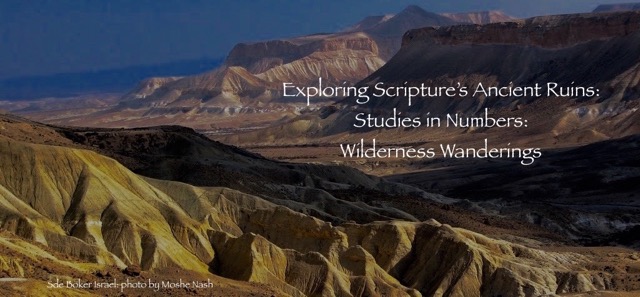
©1998-2016
Fellowship@CrossCreek
Life of Moses
How is the Soil?
Numbers 13.1ff
1.4.4; ed. 2/7/16
Introduction…Ever felt the pressure of being a minority in a given situation? Where you thought one thing, but the group or majority thought another? Was your tendency, if possible, to give in and go along with the crowd, even if you knew or suspected something different or better? How did your experience turn out? Where you right? Wrong? Did you feel any guilt? Did anyone, in the end, stand up to the group’s seeming position? What happened to them? Was that person you?
Probably, one of the most important skills you will ever develop as a Christ-follower is the courage to go against the crowd…to stand against the mob…to go against the grain…to risk rejection and possible ostracization or exclusion from the group. In fact, one has to have a tough backbone in order to risk this kind of pressure. But it’s a must if one is to follow Christ.
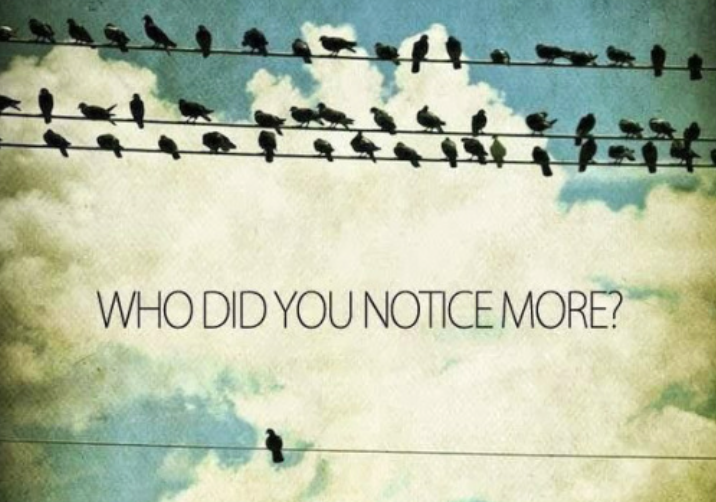
On a secondary note: how and why does this affect happen…the power of the mob?
Going a step further…
Below is a link leading to PBS’s Frontline special A Class Divided (airing on March 26, 1985). The day after Martin Luther King, Jr. was killed, a teacher in a small town in Iowa tried a daring classroom experiment. She decided to treat children with blue eyes as superior to children with brown eyes. FRONTLINE explores what those children learned about discrimination and how it still affects them today.
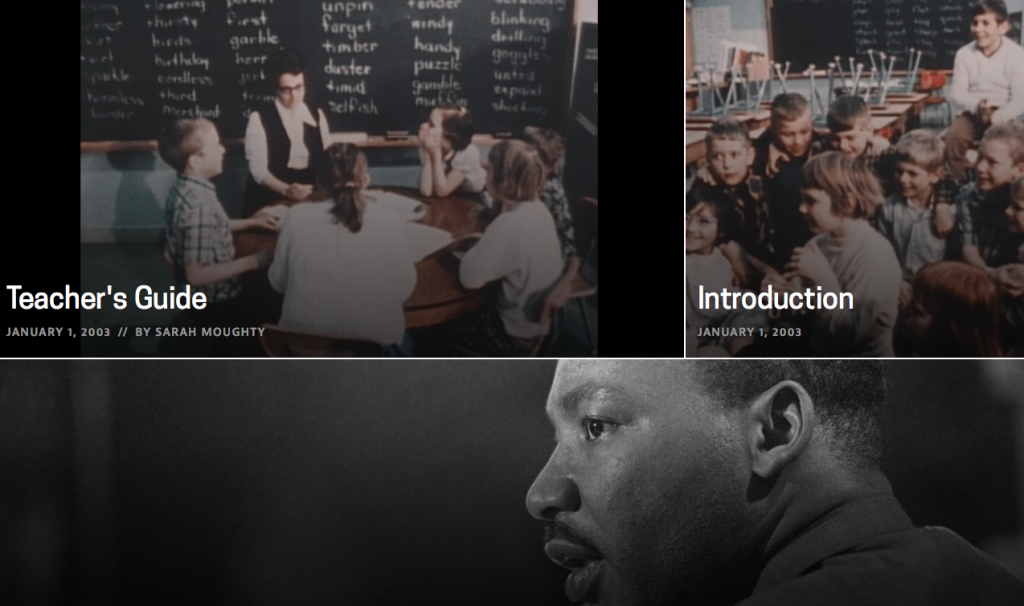
General Introduction…
It’s not always easy being a good leader. Moses is finding this out. People, even friends, even close family members that have clearly witnessed can be very fickle, have short memories and follow the crowd versus God.
The infant nation of Israel has reached the midpoint of their second year of independence from Egypt. It has been over a year since they arrived at Mt. Sinai (Ex. 19) and received their law from their rescuer, Yahweh God, through his mediator, Moses, up on Mt. Sinai (Ex. 20ff).
Having failed her faithful groom right from the onset of her marriage (via her fickle, impatient resorting to making an idolatrous golden calf to worship in place of Yahweh, as Moses had tarried too long on the mountain with Yahweh obtaining her code of laws, morals and religious ritual), Israel now continues on to her original objective—her ancestor’s Promised Lands (Ex. 32ff).
Once again, it does not take long for the new bride to stumble once again. Led by a discontented mob, Israel complains about her daily portion of manna. She cried for meat, and meat was what she got in the form of quail as far as the eye could see. But along with the meat, for her ingratitude and insolence, Israel, in the form of a minor plague also experienced the right hand of Yahweh’s discipline (Num. 11).
Chapter 12 involves a crucial leadership crisis between Moses and his siblings. All families have them. Moses’ family was no different. So when the very sister who saved Moses as an infant at the Nile River incredulously challenges her brother’s divinely-inspired right to lead Israel, the Divine painfully exposes her momentary Spiritual misjudgment.
Note: The book of Numbers gets it title from a census of Israel, which begins the book. Ultimately, Numbers takes Israel from Mt. Sinai, where she receives he code of ethics as a nation, to her ancestors’ Promised Lands in Canaan. But as often the case, with many new, fledgling nations, this new nation-bride will also make her share of youthful mistakes, several of which will be quite costly.
Pray…
Read Passage several times…(optional: if more than 12 verses, I would read only twice).
Ask Questions…
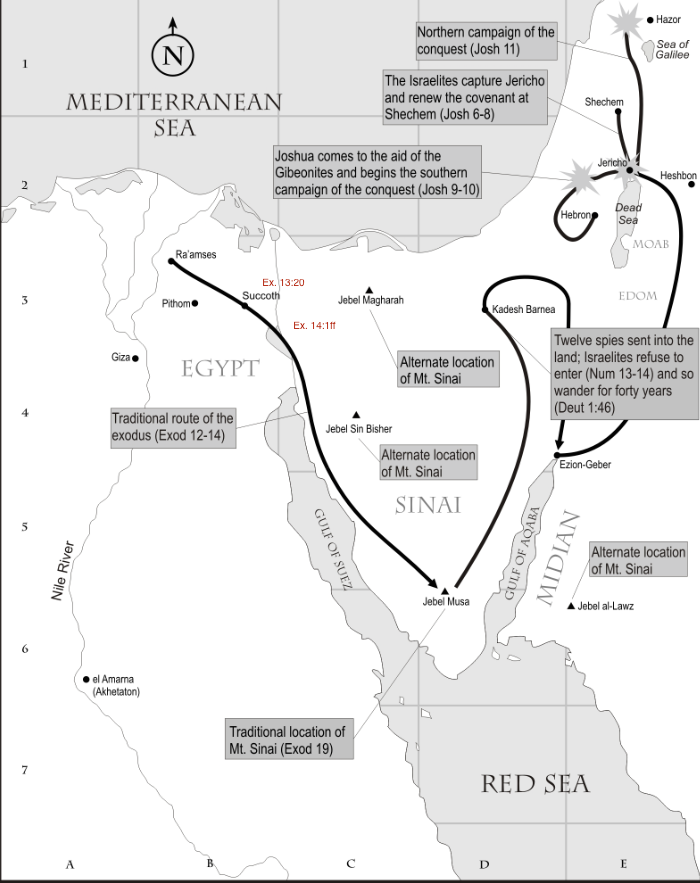
Num. 13:1 The LORD said to Moses,
2 “Send some men to explore the land of Canaan, which I am giving to the Israelites. From each ancestral tribe send one of its leaders.”
3 So at the LORD’s command Moses sent them out from the Desert of Paran. All of them were leaders of the Israelites.
4 These are their names:
from the tribe of Reuben, Shammua son of Zaccur;
5 from the tribe of Simeon, Shaphat son of Hori;
6 from the tribe of Judah, Caleb son of Jephunneh;
7 from the tribe of Issachar, Igal son of Joseph;
8 from the tribe of Ephraim, Hoshea son of Nun;
9 from the tribe of Benjamin, Palti son of Raphu;
10 from the tribe of Zebulun, Gaddiel son of Sodi;
11 from the tribe of Manasseh (a tribe of Joseph), Gaddi son of Susi;
12 from the tribe of Dan, Ammiel son of Gemalli;
13 from the tribe of Asher, Sethur son of Michael;
14 from the tribe of Naphtali, Nahbi son of Vophsi;
15 from the tribe of Gad, Geuel son of Maki.
16 These are the names of the men Moses sent to explore the land. (Moses gave Hoshea son of Nun the name Joshua.)
Why did Moses change Joshua’s name? What does “Hoshea” mean?
Note:
1) “Hoshea” (howshea` or ho-shay’-ah) is derived from the Hebrew root for “deliverance” or “salvation.”
2) Moses then changes “Hoshea’s” name from “salvation” to “Joshua”
(Yehoshu’a or yeh-ho-shoo’-ah) or “Yahweh is Salvation” (Num. 13)
3) The Aramaic short form of “Joshua” or Yehoshu’a translated into Greek is iesous which translates into English Jesus.
4) Thus Jesus’ name means “Yah is salvation” or “Yah saves.”
5) With “Yah” or “Yahweh” being God’s covenant name with Israel and possibly derived from the Hebrew root “to be” or “is,” thus “Yahweh” could mean “I AM,” the name God referred to himself with Moses at the burning bush in Ex. 3.
17 When Moses sent them to explore Canaan, he said, “Go up through the Negev and on into the hill country.
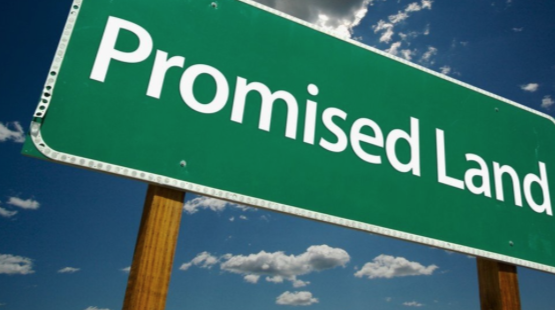
Where is the Negev? Is this the buffer region between the Sinai and Canaan or the Promise Land, kind of southern Canaan? Is this were Jerusalem is later located? How big are the hills, like the hills in the Ozarks or higher?
18 See what the land is like and whether the people who live there are strong or weak, few or many.
Why does God/Yahweh want them to do this? He already knows? Why does he want them to know? What if they are large or many? Then what? Are they preparing for battle? Will the land’s current residents not know that these are spies spying out the land?
19 What kind of land do they live in? Is it good or bad? What kind of towns do they live in? Are they unwalled or fortified?
20 How is the soil? Is it fertile or poor? Are there trees on it or not? Do your best to bring back some of the fruit of the land.” (It was the season for the first ripe grapes.)
When is this season? Is this the fall? So is this a year and a half after having left Egypt…if they left spring of the previous year?
21 So they went up and explored the land from the Desert of Zin as far as Rehob, toward Lebo Hamath.
22 They went up through the Negev and came to Hebron, where Ahiman, Sheshai and Talmai, the descendants of Anak, lived. (Hebron had been built seven years before Zoan in Egypt.)
Does this mean that this city is old since Egypt is so ancient to begin with?
23 When they reached the Valley of Eshcol, they cut off a branch bearing a single cluster of grapes. Two of them carried it on a pole between them, along with some pomegranates and figs.
24 That place was called the Valley of Eshcol because of the cluster of grapes the Israelites cut off there.
What does Eshcol mean?
25 At the end of forty days they returned from exploring the land.
26 They came back to Moses and Aaron and the whole Israelite community at Kadesh in the Desert of Paran. There they reported to them and to the whole assembly and showed them the fruit of the land.
Are they on the edge of the Promise Land? The southern border?
27 They gave Moses this account: “We went into the land to which you sent us, and it does flow with milk and honey! Here is its fruit.
28 But the people who live there are powerful, and the cities are fortified and very large. We even saw descendants of Anak there.
How large is “large”? Who are the descendents of “Anak” and why is this important?
29 The Amalekites live in the Negev; the Hittites, Jebusites and Amorites live in the hill country; and the Canaanites live near the sea and along the Jordan.”
In other words, the land is fully-occupied. No easy pickings…

30 Then Caleb silenced the people before Moses and said, “We should go up and take possession of the land, for we can certainly do it.”
How does Caleb know this? Is he trusting God?
31 But the men who had gone up with him said, “We can’t attack those people; they are stronger than we are.”
Are they only looking at their situation from an earthly point of view?
32 And they spread among the Israelites a bad report about the land they had explored. They said, “The land we explored devours those living in it. All the people we saw there are of great size.
How “great” of size? Is this exaggeration in order to discourage the Israelites from going up against the land’s occupants in war? What does this mean…”devours those living in it”?
33 We saw the Nephilim there (the descendants of Anak come from the Nephilim). We seemed like grasshoppers in our own eyes, and we looked the same to them.”
Are they Goliath the Philistine’s ancestors whom young David will slay four hundred years later? Are they descended from the sons of God who had relations with the daughter of men back in Gen. 6, creating a race of giants? And who were the “sons of God”? Some suggest fallen angels? Sounds strange to me.
Summary…it is now time to explore the land; they explore it, but are intimidated by the people. Despite Caleb’s protest they spread their report to the rest of the people.
Why? What truths do I learn about God, man, people, myself, life?
• God is true to his word. The land is flowing with milk and honey.
• They did everything right, but got it wrong. A wrong interpretation.
• People tend to look on the outward circumstances in order to make their judgments, and opposed to trusting God and seeing life or circumstances through the Divine’s lens.
• There always seems to be a few who trust in God and are willing to oppose the mob. Valiantly, Caleb attempts to stem the other spies negative reporting.
• While Caleb spoke publicly, the disobedient spies were persistently making their case more privately. But in the end, their momentary victory is Israel’s deadly loss.
So What?
2016 Application…
Thanksgiving… Fellowship has had to weather the greatest economic downturn since the Great Depression and one that the entire planet is still trying to crawl out from under and the very next year, another attempted coup, though much smaller in size. Once again, Fellowship has weathered the storm. We are alive, and yet there is still much work to do. Culture is changing right before our very eyes, and there are still things concerning an authentic cradle to grave ministry, Fellowship is and must learn…
Struggle…Twenty years later within my own Spiritual drama and ministry, I still feel like Moses, trying to lead the Children of Israel to the Promised Land, only much like Moses will do, I also feel I am preparing the next generation to cross the Jordan. There are older people in our congregation…around my age…who need purpose, because they are so talented and Spiritually mature, and there are younger ones serving in their shadows that my hope, intention and prayer is…that we hand the Spiritual baton off to well. Now what that all looks like remains to be seen, but that is the feeling and sense of things that comes to my mind. And in fact, this April, I am scheduled to officiate my first second generation wedding within our church family, having offiated the groom’s parent’s wedding a quarter of a century ago.
Truth…We are a minority. Only two of twelve stood up against the other ten and, ultimately, the rest of Israel. The ten ruled the destiny of millions. It was the same for Christ at the cross. The pseudo-righteous religious leadership ended up having the day, it would seem, in sending a righteous Messiah to his death. But in both cases, God still wins! Love still wins! Israel will eventually ascend to her Promise Land, albeit very imperfectly, as she awaits her Messiah to put all things in order. At the same time, as Israel awaits her Messiah, the church, believers from across the globe, have embraced the Suffering Messiah’s atonement for their sin, become the global force in the form of a very imperfect church, as she too awaits her Bridegroom’s return.
Application…Our nature is to not struggle…to want peace now…for the struggle to be over with…to be in the Land, with no threats and having secured the Land and our peace without having entertained all the many threats along the way. We want the kingdom now. But this was not the case for Israel, nor for Christ’s church. Both were saturated with imperfection, sin and evil. Both are imperfect. Both struggle to trust God and believe. And yet, in the midst of imperfection, both Israel and the church are sustained by the hope of a better day…one that fully exalts in the presence of our Maker. Mankind is on a long journey back to paradise in the Garden of God. In the mean time, we battle on, one day, one struggle, one fight, one prayer, one evil, one challenge at a time, knowing that it is only because of him, we have not only hope for a perfect future, but hope for strength to fight evil in the interim, even if we are the miniority. Amen!
Your Struggle?
Your Truth?
Your Application?
Scripture quotations, unless noted otherwise, are taken from the Holy Bible: New International Version‚ NIV‚ Copyright 1973, 1978, 1984, International Bible Society. Used by permission of Zondervan Bible Publishers. All rights reserved.

